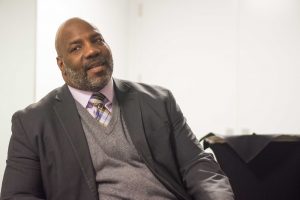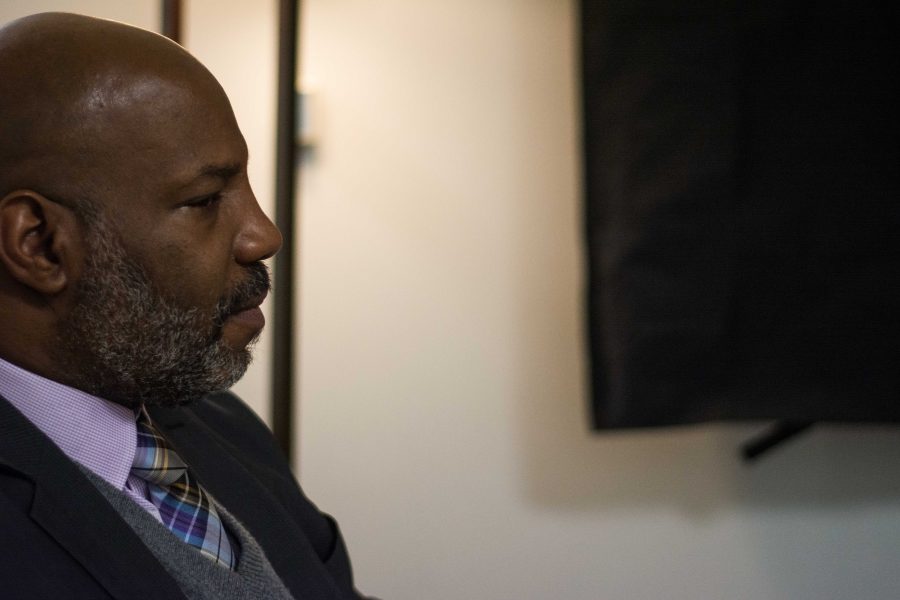Jelani Cobb came to Vanderbilt Jan. 18th to discuss racial protest in America with Chancellor Zeppos in the first Chancellor’s Lecture of the year. Late last year, Cobb wrote a column titled “From Louis Armstrong to the NFL: Ungrateful As The New Uppity” that discusses the rally where President Trump called out the NFL players for kneeling and his decisions as president. The Hustler had the opportunity to speak with Cobb prior to his lecture about the role of protest and media in this day and age.
Vanderbilt Hustler: Can journalists be purely unbiased and should they be?
Jelani Cobb: No, we can’t be because we are all human beings and we all have families and educational experiences and various institutions that we’ve been in contact with that have shaped our lives and our outlooks. You know, if you are someone who was raised in the military and moved around a lot that’s different than someone who was from a small town that has been stationary for their whole lives, and so we bring a particular set of outlooks to our world. The best that we can do is say that to recognize we are not objective and we are not unbiased, but then try to take steps to actively counteract our biases. The easiest way to do that is to talk to people you might not normally come in contact with. Talk to people who have different backgrounds from your own. Talk to people who have different ideological outlooks, you know, different politics, different faith relationships than yours. And that becomes a way of kind of actively creating a counterweight to the way that we like being conned to think as a default.
The best that we can do is say that to recognize we are not objective and we are not unbiased, but then try to take steps to actively counteract our biases.
VH: Do you think protest on campuses make a different impact than city wide protest? If so, how?
JC: I think they all have their own place. So for students that are organizing and being involved in activist work on campus you would have particular concerns that don’t relate to the concerns of the bigger community like a city. But more fundamentally probably students have an advantage in that they’re in closer proximity to the people who have power. Like most of the time you can walk right across the campus and there’s the president’s office or the chancellor’s office or whoever it is that is in charge. That’s different than your city council member or your congressional rep or the person who is enacting a policy that you may disagree with or whom you may want to get to act on your behalf in some way. And so I think that they’re not greater or lesser, but I think that they’re very distinct and kind of different undertakings.
VH: Do you think institutions properly honor MLK day? If not, what should they be doing differently?
JC: There’s a wide array, I think, of approaches to King day. Some that are better than others, and I think that the most valuable thing that people do or can do in recognition of King day is to give service to other people. I think that’s been the best innovation in terms of saying this is not a day off, but a day on. This should be a day that people can think about the struggles that have yet to be completed in the society. Do we have a full equality for everyone regardless of their race, their religion, their ethnic background, their sexual orientation, their physical abilities or disabilities. There’s all these categories of people who have been excluded in one shape or form at different times in our society. I think that is the spirit of King day, and I think it is why we should kind of recognize in the most humble and social-change oriented way.

VH: Do you think nowadays we can have movements the way we had the civil rights movement? Can we ever get the Million Man March or are people’s views too divided?
JC: If you are asking if we could have broad based mass popular movements, then yes I do. I think that there are lots of divisions in society, but there were divisions in society then and people were able to find a way around them. So there were people who were a part of the Civil Rights Movement who were not particularly religious, but it was a movement led by, for the most part, religious people. There are people who are not in the south, northerners, there are college students, there are white people who are involved in it. The whole kind of crux of this is for people to get beyond their particular points of entry in society and say these are the kind of common values we hold and common concerns that are confronting us and we can organize on the basis of that. That’s not just the civil rights movement. Every movement that we think about has had to go through some stage of that. The labor movement did, the movement for rights of gays and lesbians. Nobody starts out with a perfect choreography. They all have to go through the work of getting on the same beat.
VH: How do you think the NFL kneeling movement has raised questions about the impact of patriotism in America?
JC: It’s funny I had this conversation earlier. I think that there are different versions of patriotism. One of the versions that places a great deal of emphasis on respect for, admiration for and appreciation for the United States as is. And I think there’s another version that places a great deal of emphasis upon, maybe those things, you know, respect and admiration for what it is and has been, critically, but also a very big component of what it should and can be. And when those two definitions are in proximity they seem to clash. So there’s some people who thought that what Colin Kaepernick did was unpatriotic, but there were other people who thought that it was a reflection of patriotism. Remember the First Amendment in this country is to protect free speech. Literally the first one in those enumerated rights. Free speech is meant to be a mechanism by which the people get to offer corrective arguments to people who have power over them, and I think that is what he was attempting to do. So it’s not necessarily a question of whether we agree with it, but it’s a much bigger question of do we agree with the right to speak your mind?

